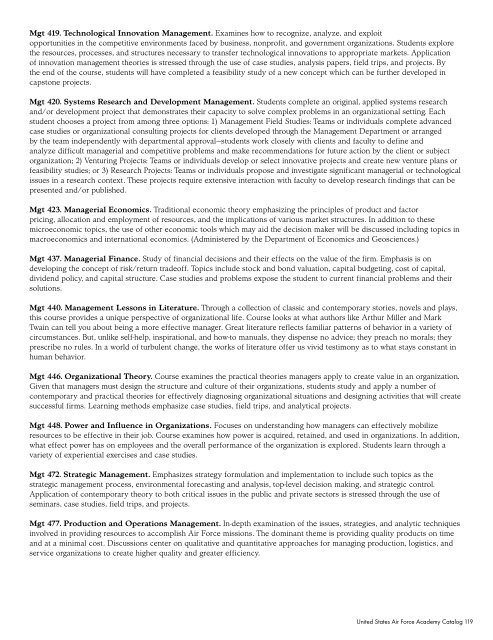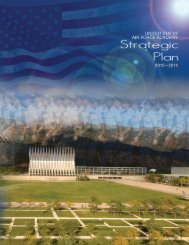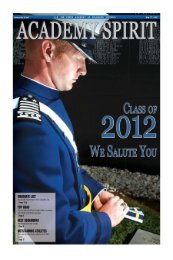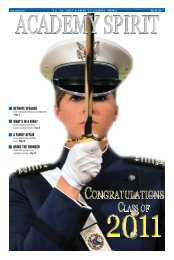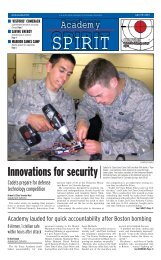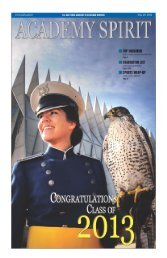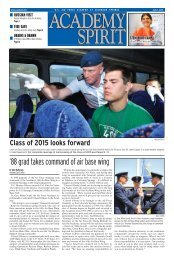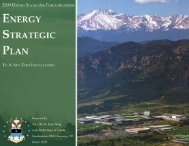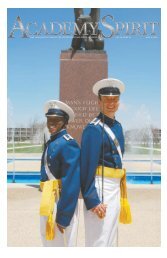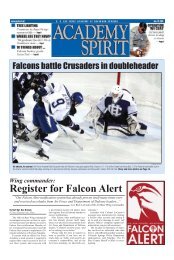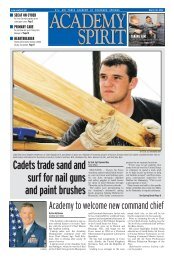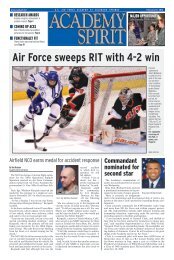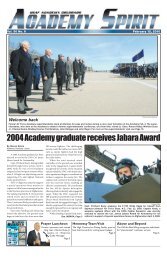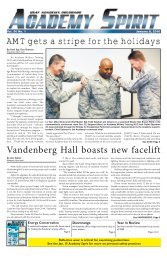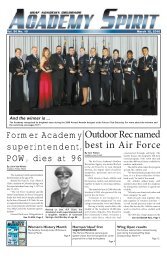2008-2009 Catalog - United States Air Force Academy
2008-2009 Catalog - United States Air Force Academy
2008-2009 Catalog - United States Air Force Academy
You also want an ePaper? Increase the reach of your titles
YUMPU automatically turns print PDFs into web optimized ePapers that Google loves.
Mgt 419. Technological Innovation Management. Examines how to recognize, analyze, and exploit<br />
opportunities in the competitive environments faced by business, nonprofit, and government organizations. Students explore<br />
the resources, processes, and structures necessary to transfer technological innovations to appropriate markets. Application<br />
of innovation management theories is stressed through the use of case studies, analysis papers, field trips, and projects. By<br />
the end of the course, students will have completed a feasibility study of a new concept which can be further developed in<br />
capstone projects.<br />
Mgt 420. Systems Research and Development Management. Students complete an original, applied systems research<br />
and/or development project that demonstrates their capacity to solve complex problems in an organizational setting. Each<br />
student chooses a project from among three options: 1) Management Field Studies: Teams or individuals complete advanced<br />
case studies or organizational consulting projects for clients developed through the Management Department or arranged<br />
by the team independently with departmental approval—students work closely with clients and faculty to define and<br />
analyze difficult managerial and competitive problems and make recommendations for future action by the client or subject<br />
organization; 2) Venturing Projects: Teams or individuals develop or select innovative projects and create new venture plans or<br />
feasibility studies; or 3) Research Projects: Teams or individuals propose and investigate significant managerial or technological<br />
issues in a research context. These projects require extensive interaction with faculty to develop research findings that can be<br />
presented and/or published.<br />
Mgt 423. Managerial Economics. Traditional economic theory emphasizing the principles of product and factor<br />
pricing, allocation and employment of resources, and the implications of various market structures. In addition to these<br />
microeconomic topics, the use of other economic tools which may aid the decision maker will be discussed including topics in<br />
macroeconomics and international economics. (Administered by the Department of Economics and Geosciences.)<br />
Mgt 437. Managerial Finance. Study of financial decisions and their effects on the value of the firm. Emphasis is on<br />
developing the concept of risk/return tradeoff. Topics include stock and bond valuation, capital budgeting, cost of capital,<br />
dividend policy, and capital structure. Case studies and problems expose the student to current financial problems and their<br />
solutions.<br />
Mgt 440. Management Lessons in Literature. Through a collection of classic and contemporary stories, novels and plays,<br />
this course provides a unique perspective of organizational life. Course looks at what authors like Arthur Miller and Mark<br />
Twain can tell you about being a more effective manager. Great literature reflects familiar patterns of behavior in a variety of<br />
circumstances. But, unlike self-help, inspirational, and how-to manuals, they dispense no advice; they preach no morals; they<br />
prescribe no rules. In a world of turbulent change, the works of literature offer us vivid testimony as to what stays constant in<br />
human behavior.<br />
Mgt 446. Organizational Theory. Course examines the practical theories managers apply to create value in an organization.<br />
Given that managers must design the structure and culture of their organizations, students study and apply a number of<br />
contemporary and practical theories for effectively diagnosing organizational situations and designing activities that will create<br />
successful firms. Learning methods emphasize case studies, field trips, and analytical projects.<br />
Mgt 448. Power and Influence in Organizations. Focuses on understanding how managers can effectively mobilize<br />
resources to be effective in their job. Course examines how power is acquired, retained, and used in organizations. In addition,<br />
what effect power has on employees and the overall performance of the organization is explored. Students learn through a<br />
variety of experiential exercises and case studies.<br />
Mgt 472. Strategic Management. Emphasizes strategy formulation and implementation to include such topics as the<br />
strategic management process, environmental forecasting and analysis, top-level decision making, and strategic control.<br />
Application of contemporary theory to both critical issues in the public and private sectors is stressed through the use of<br />
seminars, case studies, field trips, and projects.<br />
Mgt 477. Production and Operations Management. In-depth examination of the issues, strategies, and analytic techniques<br />
involved in providing resources to accomplish <strong>Air</strong> <strong>Force</strong> missions. The dominant theme is providing quality products on time<br />
and at a minimal cost. Discussions center on qualitative and quantitative approaches for managing production, logistics, and<br />
service organizations to create higher quality and greater efficiency.<br />
<strong>United</strong> <strong>States</strong> <strong>Air</strong> <strong>Force</strong> <strong>Academy</strong> <strong>Catalog</strong> 119


